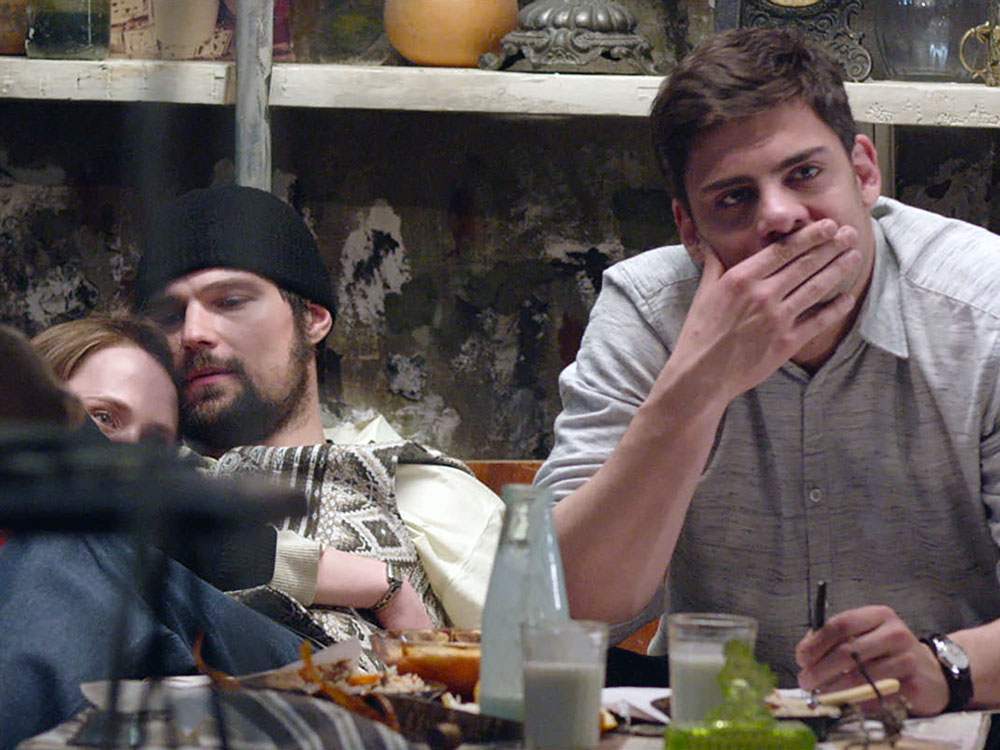Image: Here is the Imagination of the Black Radical, dir. Rhea Storr, UK 2020, 20 min., English
This event explores the creative and ethical use of moving image, film and photography as a medium for engaging with contested institutional collections, archives and histories. Specifically, institutions connected to the incarceration, exploitation and separation of bodies and objects from specific social, geographical, and cultural contexts.
The symposium aims to bring the history of representational image-making and mass media at the service of colonial, carceral and imperialist archives and collections, into dialogue with the potential capacity of image-makers to disrupt these institutional lineages. It aims to explore how documentary media have been used to shape the collective definitions and accepted values of authenticity, truth, belonging, criminality and ownership in public and private spaces
While research has been done into the history of audio-visual media used as techniques for categorising, classifying, documenting and surveilling colonial and incarcerated subjects, this event aims to develop a further perspective. It brings together academics, artists, curators and historians, to explore what Ariella Azoulay calls ‘potential history’ in promoting the creative, critical and decolonial repositioning of archives, institutions and creative practices.
The artists and researchers presenting in this event expand our notions of what it means to give and receive access to restricted spaces. How do the images we are able to circulate run parallel to the movements that bodies can make across borders? And might creative interventions with the technologies that give us access to images influence the histories of bodies that we are able to tell?
The event is curated and moderated by Astrid Korporaal, PhD candidate at Kingston University and Lecturer at the University of Groningen.
Following the symposium, Khadija von Zinnenburg Carroll will also be launching Bordered Lives: Immigration Detention Archive in the ICA Bookstore.
Programme:
11:30am – Introductions
12:00pm – Introduction to panel one: Institutional Archives, Research Companions and Unruly Histories
12:15pm – Erika Tan – Malayan weaver Halimah Binti Abdullah and the dislocated history of colonial exhibitions and museums
12:45pm – Nikolaus Perneczsky & Didi Cheeka – Moving image restitution histories and archives + Memory Also Die (2020) screening
1:15pm – Panel discussion
2:45pm – Introduction to panel two: Institutional Inversions and Reclamations
3:00pm – Screenings of The Violence of a Civilization Without Secrets (dir. Adam Khalil, Zack Khalil and Jackson Polys, 2019) + Culture Capture: Terminal Adddition (with Bayley Sweitzer, 2017)
3:30pm – Judy Price – Holloway Woman’s Prison and The Good Enough Mother (2020)
4:00pm – Khadija Carroll – Collaborating with the Immigration Detention Archive and the Pitt Rivers Museum
4:30pm – Rhea Storr – The heritage and bodily resistance of Junkanoo + Here is the Imagination of the Black Radical (2020) film screening
5:00pm – Panel discussion
Erika Tan is an artist, curator and researcher whose work focuses on the postcolonial, transnational and decolonial – working with archival artefacts, exhibition histories, received narratives, contested heritage, subjugated voices and the transnational movement of ideas, people and objects. Tan is currently The Stanley Picker Fine Art Fellow.
Didi Cheeka is co-founder and curator of Lagos Film Society – an alternative cinema center dedicated to the founding of Nigeria’s first arthouse cinema. He is the artistic director of Decasia – Berlin-Lagos Archive Film Festival. Didi is currently researching and digitizing Nigeria’s rediscovered audiovisual archives.
Nikolaus Perneczky is a writer and curator based in London. His postdoctoral research project – a critical inquiry into the politics and ethics of global film heritage – considers the archive(s) of World Cinema in relation to colonial legacies of epistemic violence and unequal exchange. Along with curator and archivist June Givanni, Nikolaus is currently working on a podcast series on Africa’s moving image heritage and the question of restitution.
Adam Khalil and Zack Khalil (Ojibway) are filmmakers and artists from Sault Ste. Marie, Michigan and currently based in Brooklyn, New York. Their work subverts traditional forms of ethnography through humour, transgression, and innovative documentary practice. Their films and installations have been exhibited at the Museum of Modern Art, Walker Arts Center, e-flux, UnionDocs, and Microscope Gallery.
Jackson Polys is an artist who lives and works between what is currently called Alaska and New York. His work reflects examinations into the limits and viability of desires for indigenous growth. He began carving with his father, Tlingit artist Nathan Jackson, in high school, has worked as an artist based in Alaska as Stron Softi, with solo exhibitions at the Alaska State Museum and the Anchorage Museum, and holds an MFA in Visual Arts from Columbia University’s School of the Arts (2015).
Judy Rabinowitz Price is interested in how art can produce different ways of thinking about contested sites and engage with collective struggles. Her most recent work explores how women are affected by the criminal justice system in the UK through the prism of HMS Holloway that was decommissioned in 2016. The End of a Sentence 2020 draws on individual and collective stories of prison to make visible issues around gender, class, race and economy as well as reflecting on Holloway’s legacy spatially and ideologically as a site of remembrance and absence.
Khadija von Zinnenburg Carroll is an Austrian-Australian artist and historian based in Vienna. She is the Chair of Global Art at the University of Birmingham, Professor of History at the Central European University. Her films and installations have been shown internationally including at the Venice, Marrakech, and Sharjah Biennales, ZKM, Manifesta, Taxispalais, Extracity, HKW, Royal Museums Greenwich, Savvy, LUX, Chisenhale, SPACE, Project Art Centre Gallery Dublin, St Kilda, Melbourne, and the Casablanca Film Festival. She is the co-author of Bordered Lives: Immigration Detention Archive (2020) and co-editor of Third Text journal.
Rhea Storr is an artist filmmaker who makes work about the representation of Black and mixed-race cultures. Masquerade as a site of protest or subversion is an ongoing theme in her work in addition to the effect of environment on cultural production. She is a co-director of not nowhere an artists’ film co-operative and resident at Somerset House, London. Storr is the winner of the Aesthetica Art Prize 2020 and the inaugural Louis Le Prince Experimental Film Prize.
This is event is supported by the International Association for Media and Art History’s IAMHIST Challenge, and the Make Film History project. Make Film History is funded by UKRI-AHRC and the Irish Research Council under the 'UK-Ireland Collaboration in the Digital Humanities Networking Call' (grant numbers AH/V002066/1 and IRC/V002066/1).
Ticket information
- All tickets that do not require ID (full price, disabled, income support) can be printed at home or stored in email
- For aged-based concession tickets (under 25, student) please bring relevant ID to collect at the front desk before the event.
Red Members gain unlimited FREE access to all exhibitions, films, talks, concerts and performances. Join today for £20/month
All films are ad-free and 18+ unless otherwise stated, and start with a 10 min. curated selection of trailers.
Members+ and all Patrons gain free entry to all cinema screenings, exhibitions, talks, and more.
Join today as a Member+ for £25/month.













no. 236848.